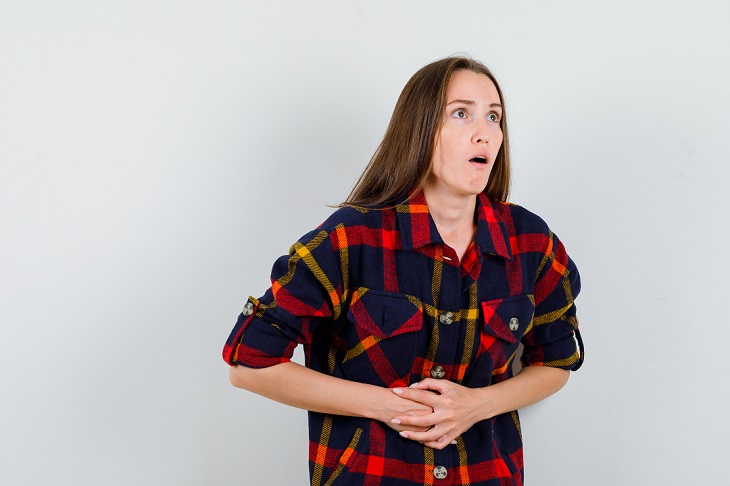what can cause constipation in women?:According to a study involving 3,029 women, 66% of them said they had gastrointestinal symptoms and 43% reported abdominal distension and constipation as discomfort.
Constipation in women can be caused by several factors, including:
- Dietary Factors:
- Low fiber intake from fruits, vegetables, and whole grains.
- Inadequate fluid consumption.
- Lifestyle Choices:
- Sedentary behavior or lack of physical activity.
- Delaying bathroom visits due to busy schedules or discomfort.
- Hormonal Changes:
- Fluctuations during menstruation, pregnancy, or menopause can affect bowel habits.
- Medical Conditions:
- Digestive disorders such as irritable bowel syndrome (IBS).
- Systemic diseases like diabetes or hypothyroidism.
- Medications:
- Certain medications, including pain relievers, antidepressants, and iron supplements, can contribute to constipation.
- Psychological Factors:
- Stress, anxiety, and depression can impact bowel function and regularity.
- Functional and Anatomical Issues:
- Problems with pelvic floor muscles or nerve function can hinder bowel movements.
According to a study involving 3,029 women, 66% of them said they had gastrointestinal symptoms and 43% reported abdominal distension and constipation as discomfort.
For 62% of these women , gastrointestinal symptoms affect their quality of life , especially constipation. According to the participants, the condition interferes with their mood, concentration
“Generally, the condition does not relate to physical or anatomical disorders of the intestine. It usually results from low fiber and fluid intake, but it is also linked to factors such as a sedentary lifestyle, anxiety, depression, and bad habits like delaying bathroom visits.”
In the case of constipation in women, there are three factors that contribute to the problem. See below what they are.
Endometriosis
Endometriosis is a chronic disease in which the endometrium, the tissue that lines the uterus, migrates to other parts of the body, including the intestine. 4 Therefore, among other symptoms, women present intestinal complaints.
Intestinal endometriosis mainly affects the rectum and sigmoid colon.6 When it affects the rectum, it causes symptoms of obstruction.6 Depending on the level of involvement of the intestinal wall, the disease causes rectal pain when defecating, constipation or diarrhea , and alternating constipation and diarrhea.
Pregnancy
Constipation in pregnant women is a very common complaint in obstetric care. In addition to diet and low water intake, there are other factors that worsen these symptoms during pregnancy.
Constipation during pregnancy also occurs due to iron supplementation, the effects of hormones on gastrointestinal motility, reduced colon motility, and reduced physical activity.
In fact, women who already suffer from constipation report that the symptom worsens during pregnancy. It is not yet known exactly why this happens, but female sex hormones appear to have an influence on gastrointestinal smooth muscle cells.
Studies indicate that high doses of progesterone inhibit motilin , a hormone that stimulates gastric emptying. Thus, increased levels of progesterone during pregnancy could cause constipation in women.
PMS
Progesterone levels peak shortly after ovulation. As you have seen, increased levels of this hormone affect intestinal motility. This would explain why women can also experience constipation during PMS .
How to relieve constipation?
Three factors are necessary to ensure proper bowel function: adequate water intake, fiber consumption and physical activity.
“Therefore, clinicians treat this symptom by increasing oral intake of vegetable fibers in the form of bran, seeds, or mucilage, always with nutritional guidance. Additionally, increasing water and other liquid intake to three to four liters per day is essential.”
These two measures are important because fibers favor the formation of fecal matter, and by drinking the appropriate amount of water, it is possible to stimulate the activity of the intestinal muscles.
But we cannot forget the last factor of this tripod. That is , to treat constipation, it is essential to promote changes in lifestyle habits and avoid a sedentary lifestyle with the practice of balanced physical activities.
It is worth noting that, in special cases, treatment can be complemented with a psychotherapeutic approach. There are also conditions in which laxatives and other types of medications are considered as complementary therapy for primary constipation , but always associated with changes in diet and behavior.¹
It is important to avoid self-medication and seek help from a specialist when necessary.
When to seek medical help?
You have seen that constipation during PMS can occur as a response to hormonal changes. We have also explained that constipation can be avoided or alleviated by making dietary changes, drinking more water and exercising.
If there is no improvement in symptoms even with these precautions, and after PMS has passed, it is important to consult a specialist .
Constipation and endometriosis can also occur together.6 Therefore, for women who have this disease, strict gynecological monitoring is essential. Also because there is a risk of intestinal endometriosis, which also leads to constipation, as explained
“Pregnant women should report the problem to their obstetrician so that the care team can take special measures to alleviate the symptoms. If they do not do this, they should inform the specialist again.
Remember that constipation can result from systemic diseases or gastrointestinal tract issues. When changes in diet and habits do not work, seek medical attention, as the problem may relate to a lack of cervix contraction or to functional or anatomical disorders in the pelvic floor.”
Natural foods , as well as whole grains, help increase daily fiber intake and minimize the discomfort of constipation in women. 9 At the same time, it is important to be careful with processed foods because their processing removes nutrients, including fiber. 9 When the measures mentioned above do not work, it is essential to seek medical help .
conclusion: what can cause constipation in women
constipation in women can arise from a variety of factors, including low fiber and fluid intake, sedentary lifestyles, hormonal fluctuations, and underlying health conditions such as anxiety and depression. Recognizing these causes is crucial for effective management. By making dietary adjustments, increasing physical activity, and seeking medical advice when necessary, women can improve their digestive health and alleviate constipation. Understanding the root causes empowers women to take proactive steps toward better well-being.
FOR FERDUR INFORMATION :https://techlicss.com/

